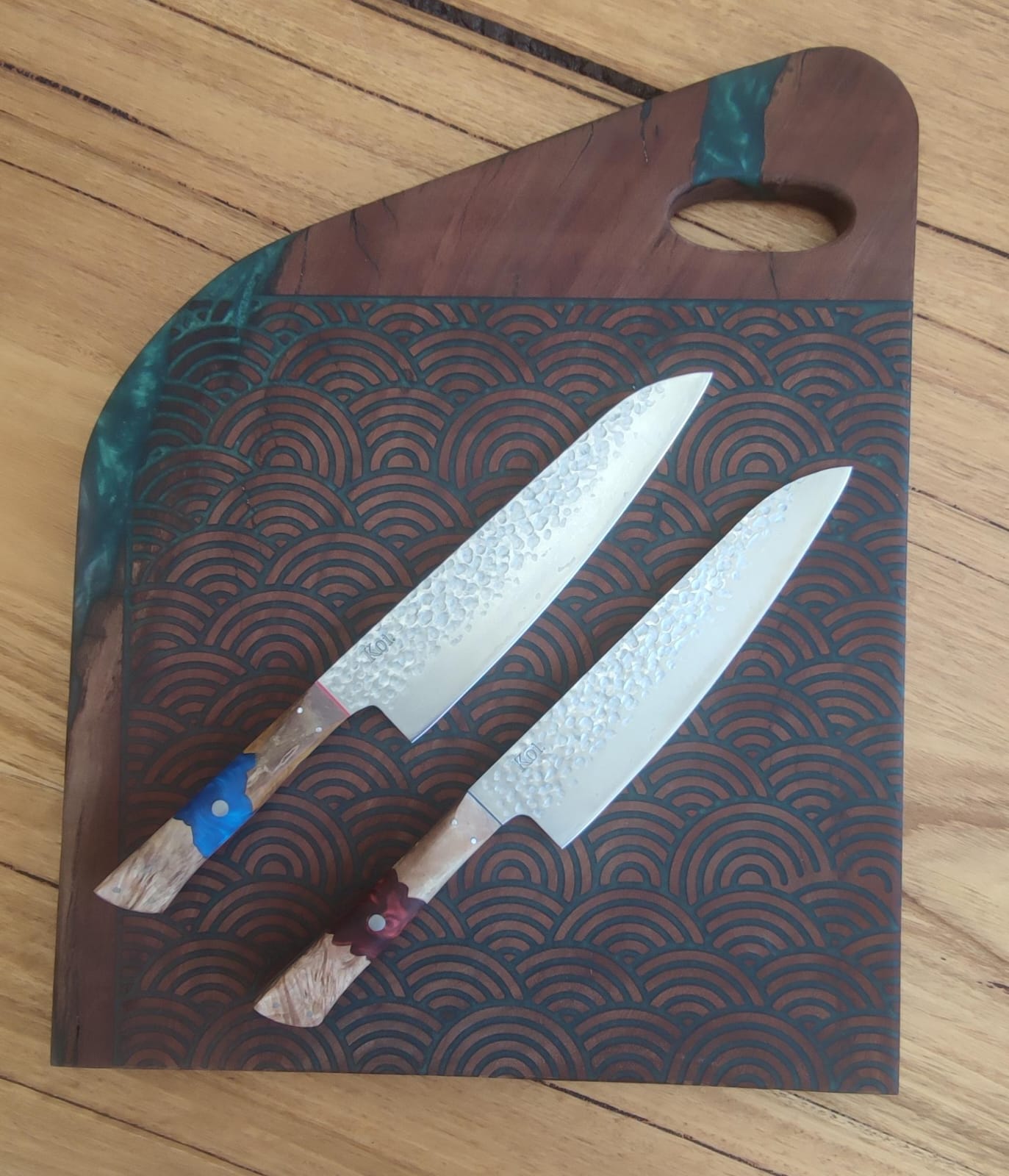Welcome to the fascinating world of Damascus steel and its use in manufacturing superb Japanese knife blades. Whether you're a knife fan or simply interested in what makes these blades so special, you're in for a treat.
Damascus Steel's mystique has caught the imagination of generations. Its famous strength, sharpness, and enthralling patterns have made it a sought-after material among knife enthusiasts worldwide.
This blog post will explore the craftsmanship of Damascus steel Japanese knife blades. These knives are more than simply tools; they represent centuries of skill while being beautiful and functional.
Prepare to embark on a trip where tradition and creativity collide to produce some of the world's best culinary partners.
Unveiling the Artistry of Damascus Steel
Damascus Steel, the stuff of legends in the knife world, has a rich and compelling history to match its entrancing patterns. Let's look into what makes it so unique.
Historical Origins of Damascus Steel
Picture ancient blacksmiths in the heart of the Middle East toiling over furnaces to produce swords of unrivalled excellence. The skill of forging steel dates back to the third century AD. The name "Damascus" is thought to come from the Syrian city where these swords initially acquired popularity.
The secret of Damascus steel lay in the perfect combination of iron and carbon, applied to intense heat followed by rapid cooling - a technology that was as well-guarded as treasure in those days.
Unique Patterns and Visual Appeal
The captivating surface pattern of Damascus steel is what distinguishes it. These knives have a distinct, flowing shape that is sometimes compared to flowing water or rippling waves due to the layering and folding process. Each Damascus blade is a unique work of art, with no two ever being the same.
This visual attraction is for aesthetic purposes and demonstrates the steel's remarkable quality and expertise. The intricate patterns are a testament to the steel's purity and ability to retain an edge.
The Science Behind Its Legendary Strength
Damascus steel's famed strength and sharpness arise from its microstructure. The repeated folding and layering align the steel's grain structure, creating a blade with incredible toughness and edge retention. This science of controlled carbide distribution is why these knives have maintained their reputation for centuries.
Crafting Japanese Knife Blades with Damascus Steel
Now that we've delved into the allure of Damascus steel let's explore how Japanese artisans transform this extraordinary material into their legendary knife blades.
Traditional Japanese Knife-making Techniques
Japanese knife-making is an art form passed down through generations. Craftsmen, often called "Togishi," meticulously handcrafted these blades using traditional techniques. Unlike mass-produced knives, each Japanese knife is a labour of love and precision.
Role of Layering and Folding in Creating Damascus Steel
At the heart of a Japanese Damascus blade lies the mesmerising pattern resulting from the layering and folding process. Smiths stack and weld together layers of high-carbon and low-carbon steel, sometimes hundreds of times. The repeated folding and forging homogenise the steel, removing impurities and creating a blade with remarkable strength and flexibility.
Achieving Sharpness and Durability
Japanese knives are renowned for their sharpness, and Damascus steel plays a crucial role. The fine grain structure, a by-product of the layering process, allows for an exceptionally keen edge. Furthermore, the steel's durability ensures that this edge can be maintained over time.
The process doesn't stop at forging; it extends to meticulous hand-sharpening. Skilled craftsmen, known as "Shiage-to," perfectly hone each blade. This results in knives that make precise cuts and hold their edge longer.
Types of Japanese Knives Utilising Damascus Steel
Japanese knives crafted from exquisite Damascus steel are designed with a specific culinary purpose, reflecting centuries of Japanese culinary tradition.
Gyuto: The Versatile Chef's Knife
The Gyuto is the Japanese answer to the Western chef's knife. With its sharp edge, it excels at precision chopping, slicing, and dicing. Whether you're a professional chef or a home cook, this all-purpose knife will quickly become your trusted kitchen companion.
Santoku: The All-Purpose Slicer
Santoku translates to "three virtues" in Japanese, symbolising its ability to handle meat, fish, and vegetables with equal grace. This shorter, wider blade is ideal for fine chopping, slicing, and dicing, making it a multitasker.
Nakiri: The Precision Vegetable Knife
For the vegetable enthusiast, the Nakiri is a dream come true. Its thin, double-edged blade and flat profile are designed for precision cuts, whether you're preparing delicate herbs or tackling dense root vegetables.
Yanagiba: The Elegant Slicer for Sushi
If sushi and sashimi are your culinary passions, the Yanagiba is your blade of choice. Its long, single-edged blade allows for graceful, paper-thin slices of raw fish, creating dishes that are as visually stunning as they are delicious.
The Performance Advantage
Let's explore why Damascus Steel is prized for its exceptional performance.
Exceptional Sharpness and Edge Retention
The fine-grain structure of Damascus steel permits blades to be polished to an extremely sharp edge. This sharpness is not only impressive but also long-lasting. Crafted with this superb steel, your Japanese knife will keep its edge through numerous slicing jobs, making kitchen prep a breeze.
Reduced Drag and Food Sticking
Damascus steel's textured surface reduces drag as you slice through components. This implies less effort and greater precision in your task. Furthermore, the lower friction minimises the likelihood of food sticking to the blade, allowing for smoother, more precise cuts.
Ease of Maintenance
These knives are well-known for their power but are also quite simple to maintain. Regular honing helps keep their edge, and they corrode less than other steels. Proper care will ensure that your Damascus steel Japanese knife lasts many years.
Caring for Your Damascus Steel Japanese Knife
Now that you're the proud owner of a remarkable Damascus steel Japanese knife let's talk about how to care for it and keep it performing its best.
- Proper Cleaning: Hand wash the blade with warm, soapy water and a soft sponge after each use. Avoid abrasive scrubbers to preserve the beautiful pattern.
- Gentle Storage: Store your knife in a knife block or magnetic strip to protect the blade's edge and prevent accidental cuts. Avoid throwing it in a drawer with other utensils.
- Honing Regularly: Use a honing rod to realign the blade's edge before each use. This helps maintain that razor-sharp edge.
Following these simple steps, your Damascus steel Japanese knife will serve you faithfully for many culinary adventures.
Summary
As we wrap up our exploration of Japanese knife blades forged from Damascus steel, you're now equipped with a deeper understanding of the artistry and craftsmanship behind these remarkable blades.
With their unique designs and razor-sharp edges, these knives are more than just cooking tools. They are a reminder of traditions that go back hundreds of years. Owning a Japanese knife made from Damascus steel is like holding a bit of history and art, whether you are a professional chef or an avid home cook.
Remember that the best way to keep these knives looking good and working well is to take care of them and keep them in good shape. If you treat them well, they'll give you precise and well-done slices every time. May your journey in the kitchen be as unique as the knives you use.




